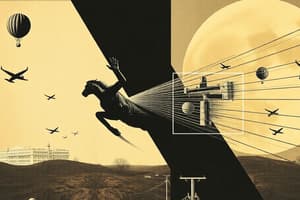Podcast
Questions and Answers
What is the fundamental idea behind Galileo's concept of projectile motion?
What is the fundamental idea behind Galileo's concept of projectile motion?
- Combination of uniform motion in the horizontal direction and uniformly accelerated motion in the vertical direction (correct)
- Uniform motion in both horizontal and vertical directions
- Uniformly accelerated motion in both horizontal and vertical directions
- Combination of uniformly accelerated motion in the horizontal direction and uniform motion in the vertical direction
What is the primary reason an object in motion will continue to move in the same direction and speed?
What is the primary reason an object in motion will continue to move in the same direction and speed?
- The absence of an unbalanced force (correct)
- The force of gravity acting on the object
- The force of air resistance acting on the object
- The force of friction acting on the object
What is the relationship between the net force acting on an object and its acceleration, according to Newton's Second Law of Motion?
What is the relationship between the net force acting on an object and its acceleration, according to Newton's Second Law of Motion?
- The acceleration of an object is directly proportional to the net force (correct)
- The acceleration of an object is directly proportional to the square of the net force
- The acceleration of an object is inversely proportional to the square of the net force
- The acceleration of an object is inversely proportional to the net force
What is the principle behind Newton's Third Law of Motion?
What is the principle behind Newton's Third Law of Motion?
What is the term for the tendency of an object to resist changes in its motion?
What is the term for the tendency of an object to resist changes in its motion?
What was Galileo's prediction about balls rolling along a horizontal plane?
What was Galileo's prediction about balls rolling along a horizontal plane?
According to Aristotle, what is the reason for an object coming to rest?
According to Aristotle, what is the reason for an object coming to rest?
What is the acceleration of a projectile in Galileo's model?
What is the acceleration of a projectile in Galileo's model?
What is the main difference between Aristotle's and Galileo's understanding of motion?
What is the main difference between Aristotle's and Galileo's understanding of motion?
According to Galileo, what is the effect of friction on an object's motion?
According to Galileo, what is the effect of friction on an object's motion?
What is the main characteristic of an object's natural motion, according to Aristotle?
What is the main characteristic of an object's natural motion, according to Aristotle?
What is the fundamental concept of Galileo's investigation on motion?
What is the fundamental concept of Galileo's investigation on motion?
What is the acceleration of pure freefall according to Galileo's experiments?
What is the acceleration of pure freefall according to Galileo's experiments?
What is the natural state of motion according to Galileo's concept?
What is the natural state of motion according to Galileo's concept?
According to Galileo's concept, what is necessary for an object to start or stop moving?
According to Galileo's concept, what is necessary for an object to start or stop moving?
What is the main difference between Aristotle's and Galileo's ideas on motion?
What is the main difference between Aristotle's and Galileo's ideas on motion?
What is the implication of Galileo's concept that an object will keep moving in a straight line forever if there is no interference?
What is the implication of Galileo's concept that an object will keep moving in a straight line forever if there is no interference?
Flashcards are hidden until you start studying




